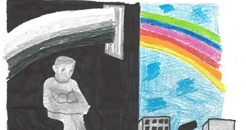 Too many children in care ending up behind bars
Too many children in care ending up behind bars
An independent review, established by Prison Reform Trust
Around half of the 1,000 children currently in custody in England and Wales have experience of the care system. This is despite fewer than 1% of all children in England, and 2% of those in Wales, being in care. While most looked after children do not get into trouble with the law, this group is still six times more likely than children in the general population to be cautioned or convicted of a crime. It costs over £200,000 each year to keep a young person in a secure children’s home and the yearly cost of a place in a young offender institution is about £60,000.
One young person said, “Since July 2013 I have been to 16 schools and I have been in 15 different placements all around the country...all of my offending has been whilst in care.”
One adult who grew up in care said, "From my experiences it felt that I was in care so it was expected I got into trouble with the police, as I was bad news. I felt that children in care were treated differently in the youth justice system to someone who may live at home with their parents.”
For nearly two-thirds of looked after children, the main reason they are in care is that they have suffered abuse or neglect. A small minority are taken into care primarily because of their own socially unacceptable behaviour.
The Queen’s Speech included proposals for a “care leavers’ covenant” to help ensure care leavers have the best start in life and to underpin “zero tolerance” of state failure around social care. The review welcomes the government’s commitment and calls on it to prioritise work to reduce the large numbers of looked after children ending up in prison.
In addition, the review recommends better early support for children and families at risk, the strengthening of joint working between children's social care services and criminal justice agencies, improvements in police practice to reduce the prosecution of children and young people in care and a greater emphasis on the importance of good parenting by the state.
The review profiled examples of good practice from across England and Wales. It found that the rate at which a minority of children move from care into the criminal justice system is not inevitable. It can be reduced - for example by as much as 45% over four years in Surrey, as a result of effective joint working.
Young people with experience of care and the criminal justice system told the review that:
-
Separation from their birth family understandably hurts and the care system must do more to help them come to terms with this;
-
Frequent changes in who looks after them, where they live, where they go to school and who offers emotional and practical support damage their prospects;
-
Support from peer mentors would help;
-
Clarity about what they can expect from the care system is crucial, as is involvement in decisions that affect their lives; and
-
They often feel isolated and unsupported at critical moments, not least if they have to appear in court or spend time in custody.
-
Some young people from minority ethnic backgrounds felt they are subject to negative stereotyping on the grounds of their race, particularly by the police, and that their cultural needs are not consistently met by children's social care services.
Unpublished data made available to the review by the Youth Justice Board for England and Wales reveals that 44% of looked after children in custody are from an ethnic minority background - this is more than one-and-a-half times the proportions in the general population and the looked after population.
Evidence from the prisons inspectorate reveals that the experience of looked after children in custody is worse in many ways than for other children in custody. Looked after children in custody reported fewer visits, less certainty about where they would be living on release, are twice as likely to consider themselves disabled, and reported higher rates of emotional or mental health problems. During their time in custody, looked after children are more likely than other children to have been physically restrained, more likely to have been placed on report, more likely to say they felt unsafe and more likely to have felt victimised by a member of staff.
Juliet Lyon, Director of the Prison Reform Trust, said, “By listening to children in care about how they have got drawn into trouble, this review provides practical and workable solutions to help break the depressing route from chaos to care to custody.”
The executive summary of the report is available here.
Churches could respond by:
-
Getting involved in Home for Good who raise awareness of the need for foster and adoptive parents, encourage families to provide loving homes for the children in care, and equip the Church to offer welcoming communities for them.
-
Talking to your local Council and Police about the needs.
Retweet about this article:
An independent review Prison Reform Trust, 01/06/2016